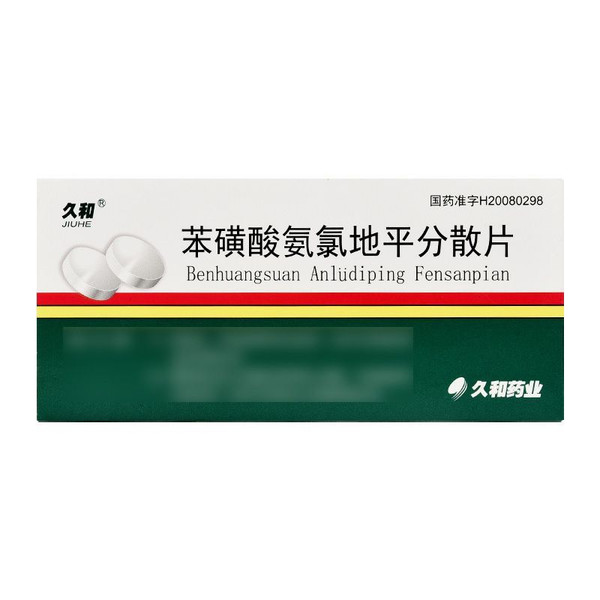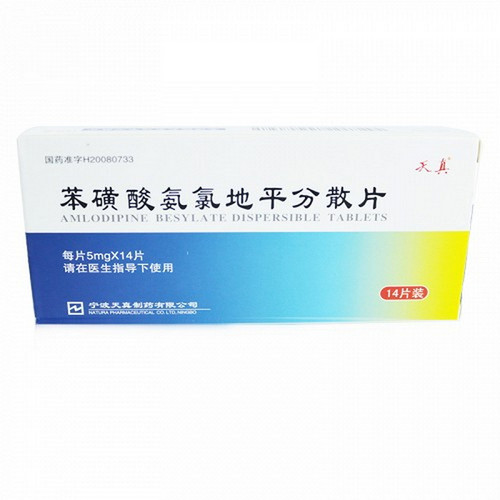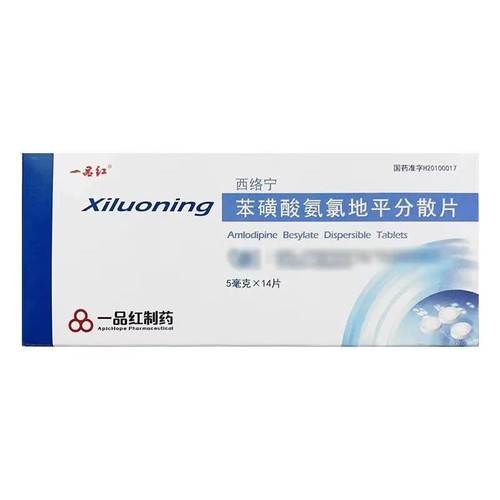Product Overview
[Drug Name]
Generic Name: Amlodipine Besylate Dispersible Tablets
Trade Name: Jiuhe
English Name: Amlodipine Besylate Dispersible Tablets
Chinese Pinyin: Benhuangsuan Anlüdiping Fensan Pian
[Ingredients]
3-Ethyl-5-methyl-2-(2-aminoethoxymethyl)-4-(2-chlorophenyl)-1,4-dihydro-6-methyl-3,5-pyridinedicarboxylate benzenesulfonate
[Properties]
This product is a white or off-white tablet.
[Indications]
1. Hypertension. This product can be used alone or in combination with other antihypertensive drugs. 2. Chronic stable angina and variant angina. This product can be used alone or in combination with other antianginal drugs.
[Dosage and Administration]
1. The initial dose for the treatment of hypertension is 5 mg once daily, with a maximum dose of 10 mg once daily. The initial dose for frail or elderly patients, or those with hepatic impairment, is 2.5 mg once daily. This dose may also be the dose that is added to other antihypertensive medications. Dose adjustments should be made based on individual patient response. Generally, dose adjustments should be initiated after 7-14 days. If clinically necessary, dose adjustments may be initiated sooner, with close observation of the patient.
2. The initial dose for the treatment of angina pectoris is 5-10 mg once daily. Lower doses are recommended for elderly patients and those with hepatic impairment; the effective dose for most patients is 10 mg/day.
[Adverse Reactions]
Amlodipine is well tolerated. In placebo-controlled clinical trials for the treatment of hypertension or angina pectoris, the most common adverse events were: autonomic nervous system: flushing; general: fatigue; cardiovascular, general: edema; central and peripheral nervous system: dizziness and headache; gastrointestinal: abdominal pain and nausea; heart rate/rhythm: palpitations; psychological: somnolence. No significant clinical laboratory abnormalities related to amlodipine were observed in these clinical trials. Less common adverse events observed after marketing include: Autonomic nervous system: dry mouth, increased sweating; Systemic: weakness, back pain, malaise, pain, weight gain/loss; Cardiovascular, general: hypotension, syncope; Central and peripheral nervous system: high muscle tone, hypoesthesia/paresthesia, peripheral neuropathy, tremor; Endocrine: breast hyperplasia; Gastrointestinal: changes in bowel habits, dyspepsia (including gastritis), gingival hyperplasia, pancreatitis, vomiting; Metabolic/nutritional: hyperglycemia; Musculoskeletal Bone: Arthralgia, muscle cramps, myalgia; Platelet/Hemorrhage/Coagulation: Purpura, thrombocytopenic purpura; Psychological: Impotence, insomnia, change in attitude; Respiratory: Cough, dyspnea; Skin/Appendages: Alopecia, skin discoloration; Special Senses: Taste disturbances, tinnitus; Urinary: Frequent urination; Vascular (Extracardiac): Vasculitis; Visual: Visual impairment; Leukocyte/Reticuloendothelial System: Leukopenia; Allergic reactions are rare and include pruritus, rash, angioedema, and erythema multiforme. Very rare cases of hepatitis, jaundice, and elevated transaminases (usually consistent with cholestasis) have been reported. Severe cases requiring hospitalization have been reported in association with amlodipine use, but in most cases, a causal relationship has not been established. Similar to other calcium channel blockers, the following adverse events have been reported rarely, but these events are difficult to distinguish from the natural history of the underlying disease: myocardial infarction, arrhythmias (including bradycardia, ventricular tachycardia, and atrial fibrillation), and chest pain.
[Contraindications]
This product is contraindicated in patients with hypersensitivity to dihydropyridines or any of its components.
[Precautions]
1. Warning: A very small number of patients, especially those with severe coronary artery obstructive disease, may experience increased frequency, prolonged duration, or severity of angina pectoris, or acute myocardial infarction, when initiating or increasing the dose of calcium channel blockers. The mechanism of action is currently unknown. 2. Because the vasodilatory effect of this product occurs gradually, rare cases of acute hypotension have been reported after taking this product. However, caution should be exercised in patients with severe aortic stenosis when using this product in combination with other peripheral vasodilators. 3. Use in Patients with Heart Failure: Calcium channel blockers should be used with caution in patients with congestive heart failure. In a long-term, placebo-controlled study (PRAISE-2) conducted in patients with non-ischemic heart failure (NYHA class IV), although the incidence of exacerbations of heart failure was not significantly different from placebo, there was an increase in reports of pulmonary edema associated with amlodipine. 4. Use in Patients with Impaired Hepatic Function: As with all other calcium channel blockers, the half-life of this drug is prolonged in patients with impaired hepatic function. However, a recommended dose has not yet been established. Therefore, this drug should be used with caution. 5. Use in Patients with Renal Failure: Changes in amlodipine plasma concentrations are not correlated with the degree of renal impairment. Therefore, a normal dose can be used. This drug is not eliminated by dialysis.
[Use in Special Populations]
Precautions for Use in Children:
There are no data available for the use of this drug in children.
Precautions for Pregnancy and Lactation:
There are no studies available on the use of this drug in pregnant women. However, based on animal studies, this drug should only be used in pregnant women when absolutely necessary. It is not known whether this drug is excreted in breast milk; lactating women taking this drug should discontinue breastfeeding. Precautions for Elderly Patients:
The time to peak plasma concentration of this drug is similar in elderly and younger patients. The increased area under the curve (AUC) and prolonged elimination half-life in elderly patients result in a decreased elimination rate. Elderly patients have been reported to tolerate similar doses of amlodipine as well as younger patients. Therefore, elderly patients can use the normal dose, but a lower initial dose and a gradual increase is advisable.
[Drug Interactions]
This drug is safe for co-administration with the following drugs: thiazide diuretics, α-adrenergic blockers, β-adrenergic blockers, angiotensin-converting enzyme inhibitors, long-acting nitrates, sublingual nitroglycerin, nonsteroidal anti-inflammatory drugs, antibiotics, and oral hypoglycemic agents. In vitro data from human plasma indicate that this drug does not affect the plasma protein binding of digoxin, phenytoin, warfarin, or indomethacin. In the following studies, co-administration of amlodipine with other drugs did not significantly alter the pharmacokinetics of either drug. Effects of Other Drugs on Amlodipine: Cimetidine: Coadministration with cimetidine did not alter the pharmacokinetics of amlodipine. Grapefruit Juice: Concomitant administration of 240 ml of grapefruit juice and 10 mg of amlodipine to 20 healthy volunteers did not significantly affect the pharmacokinetics of amlodipine. Aluminum/Magnesium (Antacids): Concomitant administration of aluminum/magnesium antacids and a single dose of amlodipine did not significantly affect the pharmacokinetics of amlodipine. Sildenafil (Viagra): A single 100 mg dose of sildenafil did not affect the pharmacokinetics of amlodipine in patients with essential hypertension. When these two drugs are used together, each drug exerts its antihypertensive effect independently. Effects of Amlodipine on Other Drugs: Atorvastatin: Multiple doses of 10 mg of amlodipine combined with 80 mg of atorvastatin did not significantly alter the steady-state pharmacokinetic parameters of atorvastatin. Digoxin: Coadministration of amlodipine and digoxin did not alter plasma digoxin concentrations or renal clearance in normal volunteers. Ethanol: Single or multiple doses of 10 mg of amlodipine had no effect on the pharmacokinetics of ethanol. Warfarin: Coadministration of amlodipine and warfarin did not alter the prothrombin reaction time of warfarin. Cyclosporine: Pharmacokinetic studies have shown that amlodipine does not significantly alter the pharmacokinetics of cyclosporine. Drug/Laboratory Test Interactions: Unknown.
[Pharmacological Action] This product is a calcium blocker (also known as a slow-channel blocker or calcium antagonist) that blocks the transmembrane entry of calcium ions into myocardial and vascular smooth muscle cells.
[Storage] Store in a sealed container protected from light. [Strength] 5mg (calculated as amlodipine)
[Packaging] 5mg x 20 tablets/box
[Expiry Date] 24 months
[Approval Number] National Medicine Standard H20080298
[Manufacturer] Nantong Jiuhe Pharmaceutical Co., Ltd.








